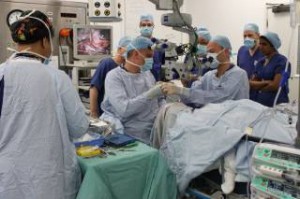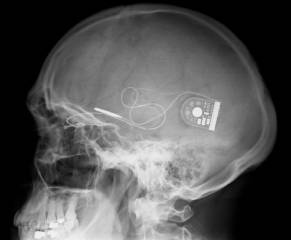Surgeons in Oxford are the first in the UK to successfully implant an electronic retina into the back of an eye. On 22 March 2012, Chris James became the first patient in the UK to receive this ground-breaking surgery as part of a clinical trial being carried out at John Radcliffe Hospital and King’s College Hospital in London.

Mr James’s operation took place at the Oxford Eye Hospital with the surgical team led by Professor Robert MacLaren.
He was assisted by Mr Tim Jackson, a consultant ophthalmic surgeon at King’s College Hospital in London. The following week, a second patient, Robin Millar, a 60 year old music producer from London, received a retinal implant at King’s College Hospital, with Professor MacLaren assisting Mr Jackson. Both patients were able to detect light immediately after the electronic retinas were switched on, and are now beginning to experience some restoration of useful vision. Further operations are now planned for other suitable patients.
The retinal implants have been developed by Retina Implant of Germany to restore some sight to people with retinitis pigmentosa, an inherited condition that affects around one in every 3,000 – 4,000 people in Europe.
Retinitis pigmentosa is a progressive disease that sees light-detecting cells in the retina deteriorate over time.
Retina Implant’s devices are designed to replace the lost cells in the retina. Patients have a small microchip containing 1,500 tiny electronic light detectors implanted below the retina. The optic nerve is able to pick up electronic signals from the microchip and patients can begin to regain some sight once more.
Professor MacLaren explains: “What makes this unique is that all functions of the retina are integrated into the chip. It has 1,500 light sensing diodes and small electrodes that stimulate the overlying nerves to create a pixellated image. Apart from a hearing aid-like device behind the ear, you would not know a patient had one implanted.”

Chris James, 54, a council worker from Wiltshire, first began to experience night blindness in his mid-20s and was diagnosed with retinitis pigmentosa following a referral to Oxford Eye Hospital.
For a number of years, Chris’ vision remained relatively stable. But in 1990, a large dip in his vision left him legally blind. In 2003, another decrease in vision rendered Chris completely blind in his left eye and only able to distinguish lights in his right.
After having the artificial retina implanted in his left eye, Chris can now recognise a plate on a table and other basic shapes. And his vision is continuing to improve as he learns to use the electronic chip in an eye that has been completely blind for over a decade.
The operation took eight hours and first required implantation of the power supply which is buried under the skin behind the ear, similar to a cochlear implant. This part of the operation was performed by Mr James Ramsden of Oxford University Hospitals assisted by Mr Markus Groppe, an academic clinical lecturer at the University of Oxford.
The electronic retina was then inserted into the back of the eye and stitched into position before being connected to the power supply.
Three weeks after the operation, Chris’ electronic retina was switched on for the first time. After some initial tuning and testing, Chris was able to distinguish light against a black background.
“As soon as I had this flash in my eye, this confirmed that my optic nerves are functioning properly which is a really promising sign,” Chris said. “It was like someone taking a photo with a flashbulb, a pulsating light, I recognised it instantly.”
Chris continues to have monthly follow-up testing of his microchip. In the meantime, he is testing the microchip at home. “It’s obviously early days but it’s encouraging that I am already able to detect light where previously this would have not been possible for me. I’m still getting used to the feedback the chip provides and it will take some time to make sense of this. Most of all, I’m really excited to be part of this research.”
Professor MacLaren says: “We are all delighted with these initial results. The vision is different to normal … and it requires a different type of brain processing. We hope, however, that the electronic chips will provide independence for many people who are blind from retinitis pigmentosa.”
The UK part of the trial is co-ordinated by Oxford University and will see up to 12 blind patients receive the implant in operations at the Oxford University Hospitals NHS Trust and King’s College Hospital in London.
The UK trial is funded by a grant from the National Institute of Health Research with extra support from the Oxford Biomedical Research Centre.
Anyone interested in finding out more information about the trial should email the research team at oehresearch@gmail.com or call the patient helpline on 01865 572900.